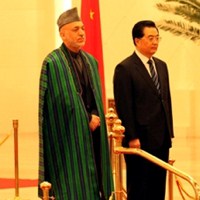Thus far, China’s policy toward Afghanistan has followed Deng Xiaoping’s famous adage regarding how China should conduct itself in the international arena: “Observe calmly; secure our position; cope with affairs calmly; hide our capacities and bide our time; be good at maintaining a low profile; and never claim leadership.” But the planned withdrawal of most, if not all, Western combat forces from Afghanistan by the end of this year will require Beijing to consider new scenarios and approaches in the country.
Chinese analysts recognize that on balance Beijing has benefited from the U.S. military effort in Afghanistan since, unlike many other countries, China has not had to make any major contributions to it. Through several major deals, Chinese companies have rapidly become the leading foreign investors in Afghanistan’s natural resource industry, while enjoying the protection of NATO and Afghan government forces. In addition to not contributing any combat forces to efforts to stabilize the country, China has not provided much development assistance either.
Chinese policymakers’ efforts to develop energy and other economic interests in nearby Central Asian countries and Pakistan have also been aided by billions of dollars of economic and military assistance the United States has provided these countries because of their decisive role in the war on terrorism. This aid has considerably exceeded the sums China has provided in the past or wants to provide in the future.

